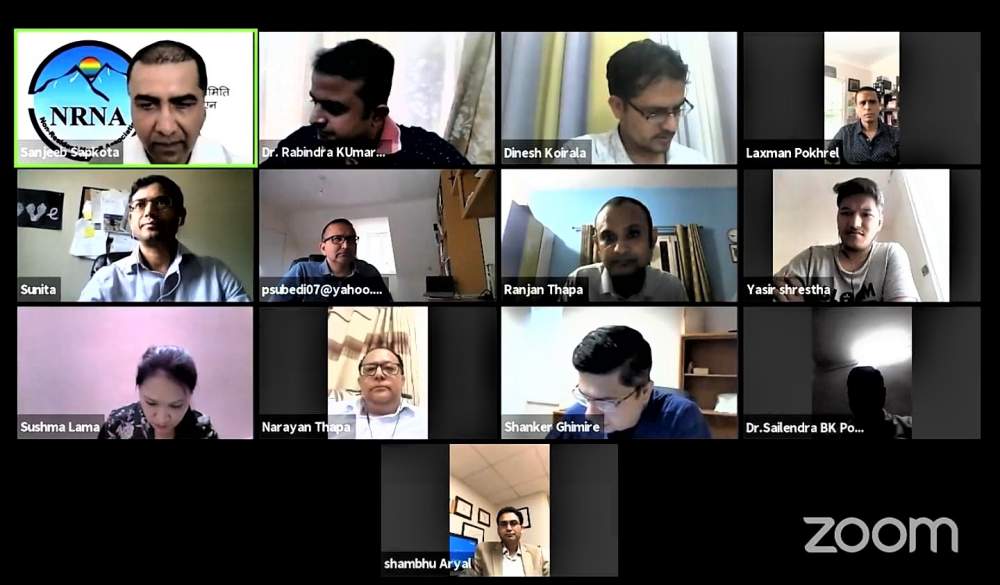

A webinar was organized by Health Committee of non-Resident Nepali Association (NRNA) on Sunday, June 28 that was participated by several Global Nepalese Doctors.
The webinar was aimed at peer-to-peer interactions among Nepali Doctors working in different regions around the world: Americas, Asia, Australia, Africa, Nepal, Europe, UK, Middle East, and other.
The webinar was opened by Dr. Sanjeeb Sapkota, Chair Global Health Team highlighting the objectives.
The webinar was moderated by Dr. Suzita Hirachan (Nepal), Dr. Laxman Pokharel (USA), Dr. Rabindra Yadav (UAE). Dr. Kenopama Gyawali provided the documentation support.
The moderators had pre-invited experienced front-line medical practitioners of Nepali origin from across the world who have had experience covering the essential fields in treating individuals infected with Corona.
Their experience included in the area of patients management e.g. diagnosis, treatment, hospitalization, advance in vaccination and medicine, gynecology, mental health.
Such experiences were heard from numerous part of the world and from Nepal.
Dr. Shambhu Aryal, a pulmonologist from in Virginia, USA described in detailed his experience, how he managed the first COVID-19 patient about four months ago and how the practice has evolved.
Dr. Aryal shared the experiences of doctors from Italy and New York helped him in managing his own patients in the hospital he is currently working in. In a short period, his medical team developed various protocols such as but not limited to: incubation of virus, anti-coagulation protocols.
Dr. Yogesh Bhusal from North Carolina, USA shared experiences on the review of number of experimental medication and the upcoming vaccination. He said, however, satisfactory vaccination and medicine are not available for immediate treatment.
Dr. Bhusal mentioned that it is likely that vaccination may be available by end of this year or early next year.
Dr. Shanker Ghimire, North Carolina, USA works for a COVID Hospital. He described practices of specialized COVID-19 hospital, treatment protocol, hospital discharge process and clinical stability.
Dr. Jagan Subedi, also from North Carolina, USA, a practicing Psychologist brilliantly discussed a current state of mind of people irrespective of infection, but seriously suffering from anxiety due to lock-down, quarantine, isolation and fear of hospitalization. Dr. Subedi discussed various clinical process to help anxiety and suicidal global citizens.
Dr. Chumal Lal Das from Nepal shared his experience of building COVID-19 hospitals in Rajbiraj and Biratnagar –Province 1 and province 2– from virtually nothing to 130 Beds within a short period of four months to accommodate increase in-flow of infected patients.
Dr. Das shared Nepal army played a positive role in construction and management of the hospitals. The hospital capacity gradually expanded with isolation ward and moving offices in tents. The hospital also has a PCR testing machine, however, results are delayed due to acute shortage of trained manpower. Dr. Das described practical and logistic issues and problems in isolation and quarantine wards.
Dr. Das shared a touching story when front-line health workers had to use home made PPE and rain coats to protect themselves at the outset of the Pandemic when there was no supply.
Dr. Narayan Bikram Thapa, Vice-president of Nepal Medical Council (NMC) praised a collaborative work between government of Nepal NMC in reviewing and developing protocols and guidelines in managing COVID-19. Dr. Thapa specifically mentioned the importance of guidelines on ethics.
Dr. Shailendra BK Pokharel, Superintendent of Dhaulagiri Hospital in Gandaki Pradesh shared the gradual development of hospital from 4 then 12 and now 55 beds. He said the PPE, isolation and quarantine are still challenging issues. Four months ago, Dhaulagiri hospital had no PPE and the Health workers had to make their own PPE with locally available materials.
Dr. Shusma Lama, a Gynecologist from Patan COVID-19 hospital shared a delicate issue managing a pregnant women. Dr. Lama shared the information about the remarkable drop on the number of patients from 700 a month last year to 450 a month this year. Dr. Lama mentioned that the hospital has prepared a guideline for COVID-19 Pregnancy Management, which includes daily meeting and reporting.
Dr. Dinesh Koirala, a Surgeon at Tribhuwan Teaching Hospital, Nepal described surgeon’s dilemma to perform emergency surgery without RDT and PCR test results. The hospital had no PCR testing facility and PPE are not adequate.
Dr. Prakash Subedi, Emergency Medicine physician practicing in the United Kingdom eloquently described psychology of general people and health care workers dealing with this unprecedented and uncertain situation and time with anxiety, fear, sense of duty, survival and even to the extend of suicide.
Dr. Subedi also shared hope and optimism to defeat the Pandemic over the time.
Dr. Rajan Thapa, Psychologist from Biratnagar, Nepal shared the mental health issues in Nepal related to isolation and quarantine. Dr. Thapa emphasized that communication and awareness are major issues and several measures have been taken to establishing help line and awareness through social media and providing access to n-cells.
Dr. Yasir Shrestha, a junior physician from Abu Dhabi shares his experience. Dr. Shrestha described people in Abu Dhabi generally have health care insurance and COVID-19 management is strictly following the guidelines prepared by the authority.
Dr. Puru Shrestha coordinator NRNA COVID-19 High-Level Committee praised the contribution of all medical professionals and encourage to search funding from the international and national organizations for capacity building and research work.
Dr. Sanjeeb Sapkota, adjourning the webinar appreciated everyone’s time and effort in making the event a success and emphasized on the multi-prong approach to managing the pandemic with emphasis on prevention, early and rapid treatment, widespread testing and the effective management of mental health of both those infected and non-infected.
Comment